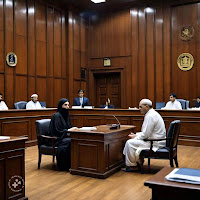
پاکستان میں طلاق/خلع کا قانون: مقدمہ دائر کرنے کا طریقہ اور طریقہ کار کی وضاحت
Divorce and Khulah are critical legal procedures in many cultures and religions. Understanding how to navigate these processes can be challenging, but this guide aims to simplify everything for you.


Introduction
Divorce and Khulah can be complex processes filled with emotional and legal challenges. Knowing how to file for these and understanding the procedures can make the journey smoother. This guide breaks down the steps and provides clarity on both processes, helping you navigate through them confidently.
Understanding Divorce and Khulah
Divorce typically refers to the legal dissolution of a marriage by a court or other competent body. It involves a legal process that ends a marriage, distributing assets, and determining custody arrangements for any children.
Khulah, on the other hand, is a form of divorce initiated by the wife in Islamic law. It allows a woman to seek a dissolution of the marriage by returning the dowry (or a part of it) to the husband.
The Differences Between Divorce and Khulah
Divorce and Khulah are two legal processes used to dissolve a marriage in Islamic law. While they both result in the termination of a marital relationship, they differ significantly in their procedures, implications, and the rights of the parties involved. Understanding these differences is crucial for anyone navigating the complexities of marital dissolution in an Islamic context. This article will explore the key distinctions between Divorce and Khulah, focusing on their definitions, legal procedures, and implications for both spouses.
Definitions
Divorce (Talaq): Divorce, or Talaq, is the unilateral right of a husband to dissolve a marriage. In Islamic jurisprudence, a husband can pronounce Talaq without the wife’s consent. This can be done verbally or in writing, and once the process is initiated, it leads to the end of the marriage after a waiting period called ‘Iddah.’
Khulah:Khulah is a process initiated by the wife, where she seeks a divorce from her husband by offering compensation. This compensation can be in the form of money, property, or any agreed-upon asset, and it is essentially a return of the dowry (Mahr) given by the husband at the time of marriage. Unlike Talaq, Khulah requires the husband’s consent.
Legal Procedures
Divorce (Talaq):
- Pronouncement: The husband pronounces Talaq either once (revocable) or three times (irrevocable).
- Waiting Period (Iddah): After pronouncement, there is a mandatory waiting period of three menstrual cycles for the wife. This period is intended to ensure that the wife is not pregnant.
- Reconciliation: During the waiting period, the husband and wife have the opportunity to reconcile. If reconciliation occurs, the marriage remains intact.
- Finalization: If no reconciliation occurs, the divorce becomes final after the waiting period.
Khulah:
- Initiation: The wife initiates Khulah by requesting a divorce from her husband and offering compensation.
- Agreement: Both parties must agree on the terms of compensation. If the husband consents, the process moves forward.
- Court Approval: In many jurisdictions, the process must be approved by an Islamic court to ensure fairness and adherence to Islamic principles.
- Finalization: Once the court approves the Khulah, the marriage is dissolved immediately.
Rights and Implications
Divorce (Talaq):
- Husband’s Rights: The husband retains the unilateral right to initiate divorce without the need for the wife’s consent.
- Wife’s Rights: The wife has the right to financial support (Nafaqah) during the waiting period and may also claim maintenance for any children from the marriage.
- Reconciliation: The husband can revoke a revocable Talaq during the waiting period, thereby resuming the marriage without a new contract.
Khulah:
- Wife’s Rights: The wife has the right to seek divorce if she is willing to return the dowry or offer other compensation. She can initiate Khulah if the marriage becomes unbearable or harmful.
- Husband’s Rights: The husband must consent to the divorce and the compensation offered by the wife.
- Irrevocability:Khulah results in an immediate and irrevocable end to the marriage, with no waiting period for reconciliation.
Social and Cultural Context
Divorce (Talaq):
- Stigma: In many cultures, Talaq may carry less social stigma as it is seen as the husband’s right. However, it can still be a source of significant social and familial pressure.
- Responsibility: The husband bears the primary responsibility for the dissolution of the marriage.
Khulah:
- Empowerment:Khulah empowers women to seek divorce, particularly in situations where they feel oppressed or unhappy.
- Challenges: Women seeking Khulah may face social stigma, legal hurdles, and resistance from their husbands.
While both Divorce (Talaq) and Khulah serve as means to dissolve a marriage, their differences lie in who initiates the process, the required consent, and the resulting implications for both parties. Talaq is a husband’s unilateral right, often involving a waiting period for potential reconciliation. In contrast, Khulah is initiated by the wife, requiring the husband’s consent and often resulting in immediate termination of the marriage. Understanding these differences is essential for navigating marital dissolution in an Islamic context, ensuring both parties are aware of their rights and responsibilities.
Legal Grounds for Divorce
In many legal systems, there are specific grounds on which a divorce can be filed. These may include:
- Adultery: When one spouse engages in a sexual relationship outside the marriage.
- Abandonment: When one spouse abandons the other without reason for a specified period.
- Cruelty: When one spouse is subjected to physical or emotional abuse.
- Irreconcilable Differences: When the couple cannot resolve their differences, leading to the breakdown of the marriage.
Legal Grounds for Khulah
In Islamic law, Khulah can be sought by the wife on several grounds, including but not limited to:
- Incompatibility: When the couple cannot live together harmoniously.
- Mistreatment: When the wife is subjected to physical or emotional abuse.
- Neglect: When the husband fails to provide for the wife’s basic needs.
- Absence: When the husband disappears or is absent for an extended period without a valid reason.
Preparing for the Suit
Before filing for divorce or Khulah, it’s essential to prepare adequately:
- Documentation: Gather all necessary documents, including marriage certificates, proof of grounds for divorce or Khulah, and financial records.
- Legal Advice: Consult with a lawyer who specializes in family law to understand your rights and the legal process.
- Support System: Ensure you have emotional and financial support from family and friends to help you through this challenging time.
Filing the Divorce Suit
Filing for divorce involves several steps:
- Petition for Divorce: The spouse seeking the divorce (the petitioner) files a petition in the family court.
- Serve the Papers: The petition must be served to the other spouse (the respondent), giving them an opportunity to respond.
- Response from Respondent: The respondent can either agree to the divorce terms or contest them.
- Mediation (if required): Some jurisdictions require mediation to resolve issues like custody and asset division.
- Court Hearing: If mediation fails, the case proceeds to a court hearing where a judge makes the final decision.
Filing the Khulah Suit
The process of filing for Khulah is somewhat similar but has specific nuances:
- Request for Khulah: The wife submits a request for Khulah to the family court.
- Return of Dowry: The wife offers to return the dowry (or part of it) to the husband as part of the Khulah agreement.
- Notice to Husband: The court sends a notice to the husband, informing him of the Khulah request.
- Hearing: A hearing is held where both parties present their case.
- Decision: The court decides on the matter based on Islamic principles and the evidence provided.
Court Proceedings
Court proceedings for both divorce and Khulah can be daunting. Here’s what to expect:
- Initial Hearing: Both parties present their initial arguments and evidence.
- Mediation (if applicable): The court may order mediation to resolve disputes amicably.
- Evidence Presentation: Both parties present evidence to support their claims.
- Witness Testimonies: Witnesses may be called to testify on behalf of either party.
- Final Hearing: The judge reviews all evidence and testimonies before making a final decision.
Finalizing the Divorce
Once the court has made a decision, the following steps are taken to finalize the divorce:
- Decree Nisi: An interim divorce order is issued, which can be made final after a specified period.
- Decree Absolute: The final order that officially ends the marriage.
- Division of Assets: The court orders the division of marital assets as per the agreement or judgment.
- Custody Arrangements: The court decides on child custody and visitation rights if applicable.
Finalizing the Khulah
For Khulah, the process is similar but tailored to Islamic law:
- Return of Dowry: The wife returns the agreed-upon dowry to the husband.
- Final Order: The court issues a final order dissolving the marriage.
- Custody and Support: The court decides on child custody and support, considering Islamic principles and the welfare of the children.
Legal Support and Resources
Navigating through divorce or Khulah can be overwhelming. Here are some resources to help:
- Family Law Attorneys: Seek professional legal advice to understand your rights and options.
- Support Groups: Join support groups for emotional and practical support.
- Online Resources: Utilize online resources and legal aid websites for additional information and assistance.
Conclusion
Understanding the processes of filing for divorce or Khulah is crucial for anyone going through these challenging times. By preparing adequately, seeking the right legal advice, and knowing what to expect, you can navigate these legal waters with confidence.
FAQs
1. What is the main difference between divorce and Khulah?
Divorce can be initiated by either spouse, whereas Khulah is initiated by the wife under Islamic law.
2. What documents are required to file for divorce?
You will need your marriage certificate, proof of grounds for divorce, financial records, and any other relevant documents.
3. How long does the divorce process take?
The duration varies depending on the complexity of the case, but it typically takes several months to a year.
4. Can a husband refuse Khulah?
A husband can contest Khulah, but the final decision rests with the court based on the evidence and grounds presented.
5. What support is available for someone going through a divorce or Khulah?
Legal aid, support groups, family and friends, and online resources can provide valuable support during this time.


Pingback: Suit For Declaration to obtain legal rights and obligations in Pakistan? - CitizenGuide
Pingback: What is Judicial Remand in Pakistan Law?